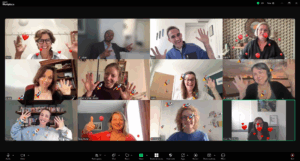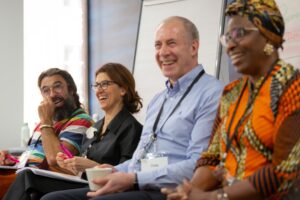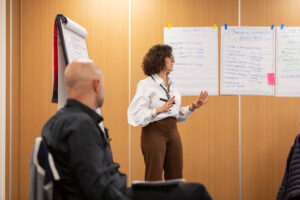Have you ever felt like there’s a part of you that remains hidden, even from the people closest to you? Perhaps it’s a dream you’ve been nurturing, a fear you’ve been holding onto, or even an idea you’re hesitant to share. This is what the Organisation and Relationship Systems Coaching (ORSC) framework calls the secret self—a concept that holds immense power in fostering authentic connections and building thriving teams.
In this blog, we’ll explore what the secret self is, why it matters, and how uncovering it can transform your relationships and team dynamics.
What is the Secret Self?
The secret self represents the parts of ourselves that we keep hidden from others. These could include:
- Private aspirations we’re not ready to reveal.
- Fears or insecurities we worry may be judged.
- Unique perspectives or ideas we feel unsure about sharing.
While it may seem easier to keep these parts of ourselves tucked away, they can act as invisible barriers to meaningful relationships and effective collaboration. The secret self isn’t inherently negative—it’s often where our greatest potential and most authentic self resides.
Why the Secret Self Matters
In relationships and team environments, the unspoken aspects of the secret self can create missed opportunities and unacknowledged tensions. Consider these impacts:
- Enhanced Connection Through Vulnerability
Sharing aspects of our secret self builds trust. Vulnerability invites others to respond with empathy and openness, deepening the bond between individuals. - Uncovering Hidden Strengths
When the secret self is shared, it can reveal untapped strengths, ideas, and talents. In teams, this can lead to breakthroughs in innovation and problem-solving. - Breaking Down Barriers
The secret self often carries fears of rejection or misunderstanding. When these fears are addressed, they pave the way for authentic communication and mutual understanding. - Healing Unspoken Tensions
In groups, unexpressed feelings or unmet needs can cause conflict. Bringing these into the open helps resolve underlying issues and fosters harmony.
How to Explore the Secret Self
The ORSC framework offers practical tools for uncovering and working with the secret self. Here are some strategies to get started:
1. Create a Safe Environment
For the secret self to emerge, individuals need to feel psychologically safe. Whether you’re in a personal relationship or leading a team, cultivate an atmosphere of trust and non-judgment.
2. Use Reflective Exercises
One simple yet powerful exercise is the sentence stem:
- “If you really knew me, you would know…”
Encourage participants to complete this sentence, revealing layers of their secret self at their own pace.
3. Facilitate Courageous Conversations
Invite individuals or teams to name the “unspoken” in the room. What’s not being said that needs to be addressed? Courageous conversations often lead to breakthroughs.
4. Acknowledge and Normalise Vulnerability
Remind yourself and others that vulnerability is a strength, not a weakness. Sharing the secret self creates opportunities for growth and connection.
Real-Life Example
Imagine a team working on a high-stakes project. One member feels undervalued but hasn’t voiced this concern, fearing it will sound like complaining. This unspoken tension leads to disengagement and resentment.
Through an ORSC exercise, the team is invited to share their secret selves. The team member bravely shares their feelings, and the group responds with understanding. This moment not only resolves the tension but also prompts the team to establish clearer ways to acknowledge contributions moving forward.
The Takeaway
The secret self is a doorway to deeper understanding, richer relationships, and greater creativity. By acknowledging and sharing this hidden part of ourselves, we allow others to see us fully—and in doing so, we foster trust, empathy, and collaboration.
In relationships and teams, the unspoken has power. When we shine a light on the secret self, we unlock the potential for authentic connection and transformative growth.
What parts of your secret self might you be ready to share?
Start the Conversation
Whether you’re navigating a personal relationship or leading a team, the secret self is a tool you can explore today. Reach out to learn more about how ORSC principles can support your goals.
Join us for one of our introductory courses in 2025!






